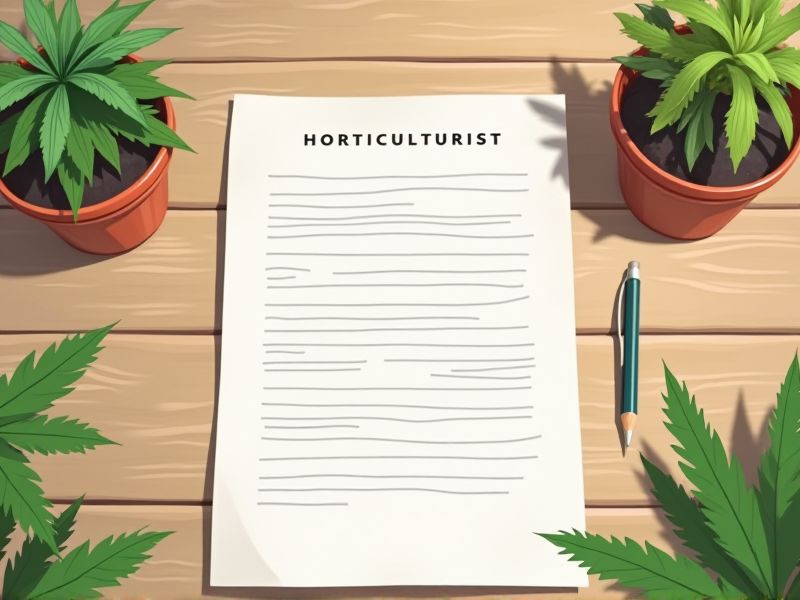
Horticulturists often work in environments where they manage plant health, pest control, and sustainable land use, making specialized knowledge crucial. Certifications ensure horticulturists meet industry standards and stay updated on best practices. They also enhance career opportunities and professional credibility in a competitive field. Here are some important certifications a horticulturist may need.
Certified Professional Horticulturist (CPH)
Certified Professional Horticulturist (CPH) enhances a horticulturist's credibility by demonstrating a verified expertise in the field. The certification often leads to better job opportunities since employers value standardized qualifications that assure professional competence. It encourages ongoing education, ensuring horticulturists stay updated on current scientific advancements and techniques. CPH helps generate trust among clients, as they prefer professionals who have undergone rigorous training and assessment.
Certified Horticultural Specialist (CHS)
Certified Horticultural Specialists provide evidence-based expertise, which enhances the credibility and reliability of horticultural practices. This certification equips horticulturists with advanced knowledge in plant biology, contributing to improved plant health and increased yield. Earning such credentials often leads to better job prospects and opportunities for career advancement in the competitive horticulture industry. Certification ensures adherence to industry standards, facilitating the implementation of sustainable and environmentally friendly practices.
Integrated Pest Management (IPM) Certification
Receiving IPM Certification equips horticulturists with the knowledge to manage pests effectively, reducing reliance on chemical pesticides. This certification fosters environmentally sustainable practices, minimizing negative impacts on ecosystems. The certification enhances credibility and trust with consumers seeking sustainably grown products. Navigating regulatory requirements becomes more straightforward with the right IPM techniques, promoting industry compliance and safety.
Pesticide Applicator Certification
Pesticide Applicator Certification ensures horticulturists possess the necessary knowledge to apply chemicals safely, protecting both human health and the environment. Certification mandates an understanding of pest control regulations, preventing legal violations and potential fines. Certified applicators are better equipped to manage pest resistance, ensuring long-term agricultural productivity. It also signifies professionalism and credibility, enhancing trust with clients and stakeholders in the horticultural industry.
Certified Arborist Certification
Certified Arborist Certification ensures that a horticulturist possesses specialized knowledge in tree care, enhancing expertise in maintaining healthy landscapes. This certification validates the professional's ability to diagnose and treat tree-related issues, leading to improved plant health outcomes. It instills confidence in clients seeking expert advice for their trees, thereby expanding the professional's clientele base. Moreover, certified arborists adhere to industry standards, promoting sustainable and safe practices within horticultural projects.
Landscape Industry Certified Technician (LICT)
Obtaining the Landscape Industry Certified Technician (LICT) certification provides a horticulturist with verified skills and competency in practical landscape management and maintenance practices, ensuring professionalism in the industry. Certification can enhance trust and credibility with clients or employers, as it shows commitment to high industry standards. It may also lead to more job opportunities or career advancement, given that certain clients or companies prefer or mandate certified professionals. The LICT certification often involves staying updated with the latest techniques and standards, promoting ongoing professional development for horticulturists.
Certified Greenhouse Professional (CGP)
A Certified Greenhouse Professional (CGP) is crucial for horticulturists due to their expertise in sustainable greenhouse management, which enhances plant growth and environmental conservation. Their knowledge in integrating advanced technologies helps optimize resource use, leading to increased efficiency and lower operational costs. They employ pest management strategies that reduce reliance on chemical control, thus promoting a healthier ecosystem. Regulatory compliance becomes more streamlined as they are trained in current environmental standards and practices.
Organic Crop Certification
Organic crop certification is crucial for horticulturists because it ensures their produce meets specific, regulated standards, promoting trust among consumers seeking organic options. This certification process leads to increased market opportunities as demand for organic products continues to rise. Compliance with these standards can result in better soil health and reduced chemical runoff, benefiting the environment. Certification also protects horticulturists from misleading claims by competitors, establishing a clear market differentiation.
Sustainable Landscape Certification
Sustainable Landscape Certification equips horticulturists with the knowledge to minimize environmental impact, promoting biodiversity through eco-friendly practices. Certified professionals can increase their marketability because they meet growing consumer demand for sustainable and responsible gardening. This certification assures clients that their landscapes will be managed sustainably, leading to improved ecosystem health. Access to advanced sustainable practices also enhances a horticulturist's ability to conserve resources, such as water and energy, while maintaining vibrant landscapes.
Certificate in Plant Propagation Techniques
A Certificate in Plant Propagation Techniques equips horticulturists with essential knowledge about modern propagation methods, directly enhancing plant survival and growth rates. Proper propagation skills reduce waste in cultivation processes, leading to cost-effective nursery management. Advanced training enables horticulturists to introduce and conserve rare or endangered plant species, thus contributing to biodiversity. Competency in propagation techniques increases a horticulturist's employability, meeting industry demands for skilled professionals.
Summary
When you, as a horticulturist, obtain certifications, your professional credibility likely increases. Employers may perceive you as more skilled, potentially leading to advanced career opportunities and higher salaries. Certified horticulturists often gain access to exclusive industry resources and networks. These enhancements can significantly impact your career growth and industry influence.
